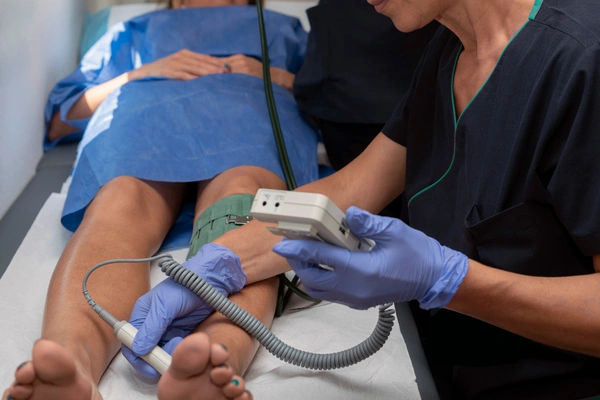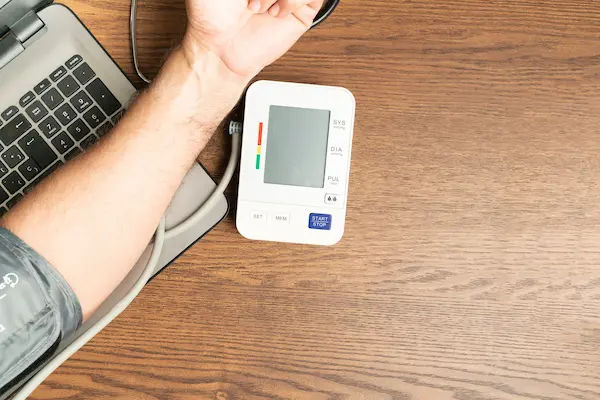Heart Blood Tests for Diagnosing Conditions
Explore essential heart blood tests used to diagnose cardiovascular conditions. Learn their purpose, significance, and how they help in early detection and treatment.

Written by Dr. Vasanthasree Nair
Reviewed by Dr. Rohinipriyanka Pondugula MBBS
Last updated on 2nd Sep, 2025
.webp?tr=q-80,f-webp,w-350,dpr-2,c-at_max 700w)
Your heart is one of the most vital organs in your body, working tirelessly to pump blood and keep you alive. Sometimes, your doctor may recommend blood tests to check how well your heart is functioning or to diagnose potential heart conditions. These tests provide valuable insights into your heart health and help doctors detect problems early.
In this article, we’ll explain the common blood tests used to diagnose heart conditions, what they measure, and what the results might mean for you.
Why Are Heart Blood Tests Important?
Heart blood tests help doctors:
- Detect heart diseases early.
- Monitor existing heart conditions.
- Assess the risk of future heart problems.
- Evaluate the effectiveness of treatments.
These tests are simple, usually requiring just a small blood sample, but they provide crucial information about your heart’s health.
Consult a Top Cardiologist
Common Heart Blood Tests
Below are a few common heart blood tests,
1. Lipid Profile (Cholesterol Test)
What it measures:
- Total cholesterol – Overall cholesterol level.
- LDL ("bad" cholesterol) – High levels can clog arteries.
- HDL ("good" cholesterol) – Helps remove LDL from blood.
- Triglycerides – High levels increase heart disease risk.
Why it’s done:
- Checks risk of heart disease and stroke.
- Helps decide if lifestyle changes or medications (like statins) are needed.
What to do if levels are high:
- Eat heart-healthy foods (fruits, vegetables, whole grains, lean proteins).
- Exercise regularly.
- Avoid smoking and limit alcohol.
2. Troponin Test
What it measures:
- Troponin proteins – Released when the heart muscle is damaged (e.g., during a heart attack).
Why it’s done:
- Diagnoses a heart attack.
- Monitors heart damage after surgery or severe illness.
What to do if levels are high:
- Seek emergency medical help immediately.
3. BNP (B-Type Natriuretic Peptide) or NT-proBNP Test
What it measures:
- BNP levels – Rise when the heart is strained (common in heart failure).
Why it’s done:
- Diagnoses or monitors heart failure.
- Checks severity of heart-related symptoms (shortness of breath, swelling).
What to do if levels are high:
- Follow doctor-recommended treatments (medications, diet changes).
- Reduce salt intake to ease fluid buildup.
4. CRP (C-Reactive Protein) Test
What it measures:
- Inflammation levels – High CRP may indicate artery inflammation, increasing heart disease risk.
Why it’s done:
- Assesses risk of heart disease, especially in people with high cholesterol or diabetes.
What to do if levels are high:
- Adopt an anti-inflammatory diet (fruits, vegetables, omega-3 fatty acids).
- Exercise and maintain a healthy weight.
5. Complete Blood Count (CBC)
What it measures:
- Red & white blood cells, platelets – Helps detect infections, anemia, or clotting issues affecting the heart.
Why it’s done:
- Checks for conditions like anemia, which can worsen heart problems.
What to do if abnormal:
- Follow doctor’s advice (iron supplements, dietary changes).
6. Blood Sugar Tests (Fasting Glucose & HbA1c)
What it measures:
- Blood sugar levels – High levels increase heart disease risk.
Why it’s done:
- Screens for diabetes or prediabetes, which harm heart health.
What to do if levels are high:
- Reduce sugar and refined carbs.
- Exercise regularly to improve insulin sensitivity.
Get Your Health Assessed
When Should You Get a Heart Blood Test?
Your doctor may recommend these tests if you:
- Have chest pain, shortness of breath, or fatigue.
- Have a family history of heart disease.
- Have high blood pressure, diabetes, or obesity.
- Are on heart medications (to monitor effects).
How to Prepare for a Heart Blood Test
- Fasting: Some tests (like lipid profile) require 8-12 hours of fasting.
- Medications: Inform your doctor about any medicines you take.
- Hydration: Drink water unless instructed otherwise.
What Do Abnormal Results Mean?
Abnormal results don’t always mean a serious problem, they help doctors decide next steps. Your doctor may suggest:
- Lifestyle changes (diet, exercise).
- Medications (statins, blood thinners).
- Further tests (ECG, echocardiogram).
Tips for a Healthy Heart
Below are a few tips for a healthy heart,
- Eat well: More fruits, veggies, whole grains, and lean proteins.
- Stay active: Aim for 30 minutes of exercise daily.
- Quit smoking: Smoking damages blood vessels.
- Manage stress: Practice meditation or deep breathing.
- Regular check-ups: Early detection saves lives.
Need a Heart Blood Test? Apollo 24|7 Can Help!
If you’re concerned about your heart health, Apollo 24|7 offers convenient blood tests and expert consultations. You can:
- Book a test online – No long waits.
- Consult a cardiologist – Get personalized advice.
Early detection is key to preventing heart disease. Take charge of your heart health today!
Final Thoughts
Heart blood tests are simple yet powerful tools to keep your heart in check. By understanding these tests and taking preventive steps, you can reduce your risk of heart disease and live a healthier life.
Consult a Top Cardiologist
Consult a Top Cardiologist

Dr. Syed Akram Ali
Cardiologist
14 Years • MBBS DCH DNB(PED) DNB(CARD) CONSULTANT INTERVENTOINAL CARDIOLOGIST, EUROPEAN SOCIETY OF CARDIOLOGY CERTIFIED HEART FAILURE SPECIALIST
Hyderabad
AYMAN POLYCLINIC, Hyderabad

Dr. Sumanta Chatterjee
Cardiologist
12 Years • MBBS,MD General Medicine,DM Cardiology
Kolkata
HealthYou Speciality Clinic & Diagnostics., Kolkata
(25+ Patients)
Dr. Praveen Kumar
Cardiologist
25 Years • MBBS, MD (Medicine), DM (Cardiology)
Ghaziabad
Navaanya wellness, Ghaziabad
Dr. Sibashankar Kar
Cardiologist
10 Years • MBBS, DNB
Bhubaneswar
Hi-Tech Medical College & Hospital, Bhubaneswar

Dr Krishna N D
Cardiologist
10 Years • MBBS, MD Physician, Post Graduate Diploma Clinical Cardio Physician
Dibrugarh
Apollo clinic Dibrugarh, Dibrugarh
Consult a Top Cardiologist

Dr. Syed Akram Ali
Cardiologist
14 Years • MBBS DCH DNB(PED) DNB(CARD) CONSULTANT INTERVENTOINAL CARDIOLOGIST, EUROPEAN SOCIETY OF CARDIOLOGY CERTIFIED HEART FAILURE SPECIALIST
Hyderabad
AYMAN POLYCLINIC, Hyderabad

Dr. Sumanta Chatterjee
Cardiologist
12 Years • MBBS,MD General Medicine,DM Cardiology
Kolkata
HealthYou Speciality Clinic & Diagnostics., Kolkata
(25+ Patients)
Dr. Praveen Kumar
Cardiologist
25 Years • MBBS, MD (Medicine), DM (Cardiology)
Ghaziabad
Navaanya wellness, Ghaziabad
Dr. Sibashankar Kar
Cardiologist
10 Years • MBBS, DNB
Bhubaneswar
Hi-Tech Medical College & Hospital, Bhubaneswar

Dr Krishna N D
Cardiologist
10 Years • MBBS, MD Physician, Post Graduate Diploma Clinical Cardio Physician
Dibrugarh
Apollo clinic Dibrugarh, Dibrugarh




.webp)
